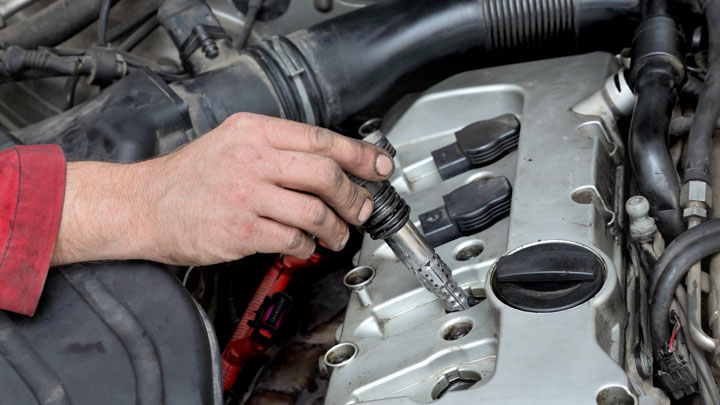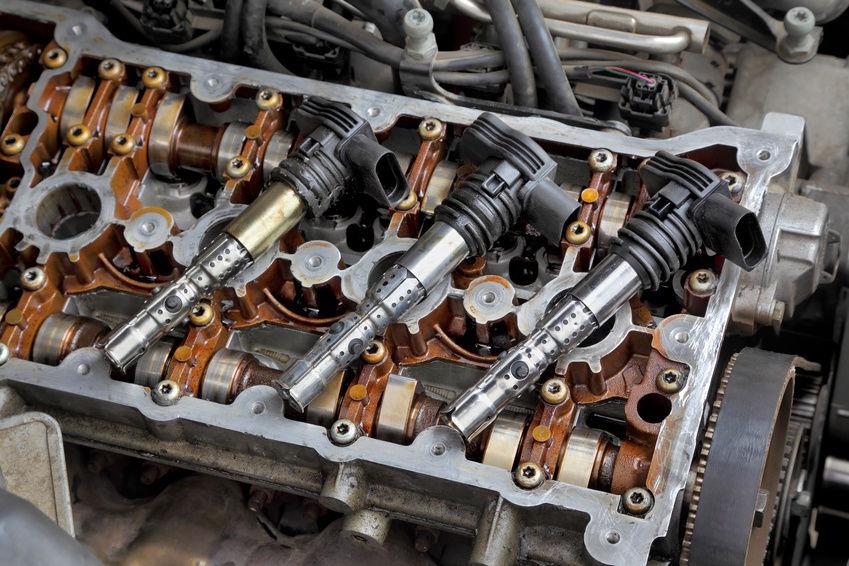The coil pack has a major role in starting the car and keep the engine running without any trouble. The spark plug in the engine requires a high voltage to create a spark and start the combustion process. The coil pack does the job of producing that required high voltage. The engine won’t start, and your car won’t function smoothly if there’s any problem with this component. So, you need to be aware of bad coil pack symptoms because any problem with it will lead to engine performance issues.
Contents
What Is Coil Pack?
A coil pack is an electronic piece of equipment within the ignition system. This electronically-controlled pack consists of ignition coils that are controlled by the car’s main computer. The main function of the coil pack is increasing and building the energy needed, then releasing the voltage through the spark plug cables. When the energy reaches the spark plugs, it starts the combustion process.

Read here, many drivers will have a question ”are ignition coils and coil packs the same thing?” Our answer is “No”. Coil packs and ignition coils are not the same thing in a car, although they serve a similar purpose.
An ignition coil is a component of the ignition system that transforms the battery’s low voltage into the high voltage needed to create an electric spark in the spark plugs. Typically, a vehicle with a traditional distributor-based ignition system will have one ignition coil, which generates the high voltage for all the spark plugs.
On the other hand, a coil pack (also known as an ignition coil module) is a component found in vehicles equipped with a distributorless ignition system (DIS) or a coil-on-plug (COP) system. In these systems, each cylinder has its ignition coil, and the coil packs are usually mounted directly on top of the spark plugs or near them. This configuration eliminates the need for a distributor and allows for more precise control of the ignition timing.
In the new car model. The coil pack is replaced by the distributor. This is typically because the coil pack is more reliable and consistent than the distributor. Moreover, the coil pack provides a better spark, which causes more efficient and quicker combustion, along with higher horsepower.
Bad Coil Pack Symptoms You Shouldn’t Ignore
Your car won’t perform properly if there’s any problem with the coil pack. The usual signs of a bad coil pack is the answer for the question of how to tell if coil pack is bad.
- The engine is misfiring
- The car engine making louder sounds than usual
- The engine is idling roughly
- Flames coming out of the carburetor
- Backfiring
- Blinking engine lights
- A drop in RPMs during acceleration
- Exhaust puffing smell of gasoline
- The engine light coming on
- The car won’t start
1. The engine is misfiring
Engine misfiring is one of the bad coil pack symptoms. Trying to start the engine of such a vehicle will result in engine misfiring that sounds like a coughing, sputtering noise. When driving at high speeds, jerking, and spitting will be seen in the behavior of the vehicle. A vehicle with a failed ignition coil will also result in vibration when it is idling at a stop sign or light.

2. The engine is idling roughly
Another symptom of weak coil pack symptoms is the rough idling of the engine. It feels like your vehicle is missing some power when driving. Rough idling is what happens when coil pack goes bad so you need to fix it right after you find this symptom.
3. Backfiring
Backfiring caused by your vehicle can indicate the symptoms of the ignition coil failure in its early stages. Car backfiring occurs when the unused fuel in the combustion cylinders of the engine leaves through the exhaust pipe. If this problem is not checked and fixed, it can result in costly repairs. If your car has backfiring, you will see the emission of black smoke through the exhaust pipe.
4. Exhaust smoke comes out
The bad coil pack symptoms can also be determined by the exhaust smoke coming out when the vehicle is running. The smoke comes out intermittently instead of in a normal steady stream
5. A drop in RPMs during acceleration
If you have a faulty coil pack, the drop in RPMs during acceleration can happen. It can be determined by watching the RPM gauge while driving. During acceleration, the check engine light either comes in intermittently or blinks.
6. Lower fuel economy
If your ignition coil does not transmit enough energy to the spark plugs in your car, your vehicle will have to burn and use extra fuel. It is the only way that the vehicle can keep running – by burning the extra and residual fuel. If your car is getting very poor gas mileage and a lot lower than normal, then you might have coil pack problems.
7. Engine light coming on
So, how do you check for a bad coil pack? You can check the engine light! Usually, the engine light will turn on in your dash, and the engine code is P0351 when scanning using a car diagnostic tool. The easiest way to tell ignition coil pack symptoms is by scanning the error code. So by seeing the error code, you can check the engine light and figure out what is the coil pack problem.
8. The car won’t start
The car does not start also is one of the bad coil pack symptoms. If you try to start your car and it seems not to start, it is possible that your car has a problem with the coil pack.
Read more:
- White Smoke From Exhaust: Main Causes and How to Fix
- Causes of Steering Wheel Makes Noise When Turning
Watch more:
How to Diagnose a Faulty Coil Pack
The ignition coils are reliable but they can fail for various reasons such as vibration and extreme heat. However, voltage overload caused by plug wires or bad spark plugs is the most common reason for their failure.
If you spot any of the bad coil pack symptoms, you should diagnose them to see if they have any problems. A few methods of how to test a coil pack have been discussed below:
Use an ohmmeter
You have to measure the coil’s primary and secondary resistance to find out if it’s in a fully functioning condition, and you have to use an ohmmeter to do that.
Connect the ohmmeter to the high voltage output terminal and the positive (+) terminal to measure the secondary resistance. Reading between 6,000 and 8,000 ohms is normal if the coil is new while some coils may read more than 15,000 ohms.
Measure the secondary resistance by connecting the ohmmeter to the high-voltage output terminal and the positive (+) terminal. A reading between 6,000 and 8,000 ohms is normal if the coil is new while some coils may read more than 15,000 ohms.
Other two ways of testing the resistance are to use either a spark tester that is inexpensive and available at most auto part stores or an ignition coil bench tester that is available in auto repair shops.
No matter which method you apply, never try to pull off the high-voltage output wire or a plug wire to test for a spark. An open wire is risky as it can give a severe shock. Besides, sudden unplugging of the wire can damage the coil by increasing the voltage demand. So, when you detect bad coil pack symptoms, follow a proper method to test the coil’s resistance.
Sum Up
The 8 symptoms above are the bad coil pack symptoms. You can check with your car, if your car has one or more than one symptom, your car may have a faulty coil pack. Bring your car to the mechanic to diagnose your car and have the repair when needed.
Check out other useful car maintenance tips provided by Car From Japan experts here!




Rather than test primary and secondary resistances you tested secondary twice. Great otherwise
Thank u for your comment
Hi
I wish to know the problem with my car. When driving at 70km/h, the wheels start vibrating, what is the cause?
Thank you
Balance the tires and check for any tire blemish / damage
My car when I start the engine, it’s start and stop then when I start again it’s start but the engine is vibrate.And when I put first gear I must use accelerate harder to able to move. And the rev counter it’s goes up and down when I stop at the stop sign
Sounds like a vacuum leak
Possible vacuum hose needs replacement or reattached
Good tips
Why will it fire on 3 and not the other 3 on coil pack
I have a problem with my car, as uim driving it suddenly shuts down and stops, then it wont even turn over for a few attaempts and then restarts again after 5 minutes, could this be coil pack?